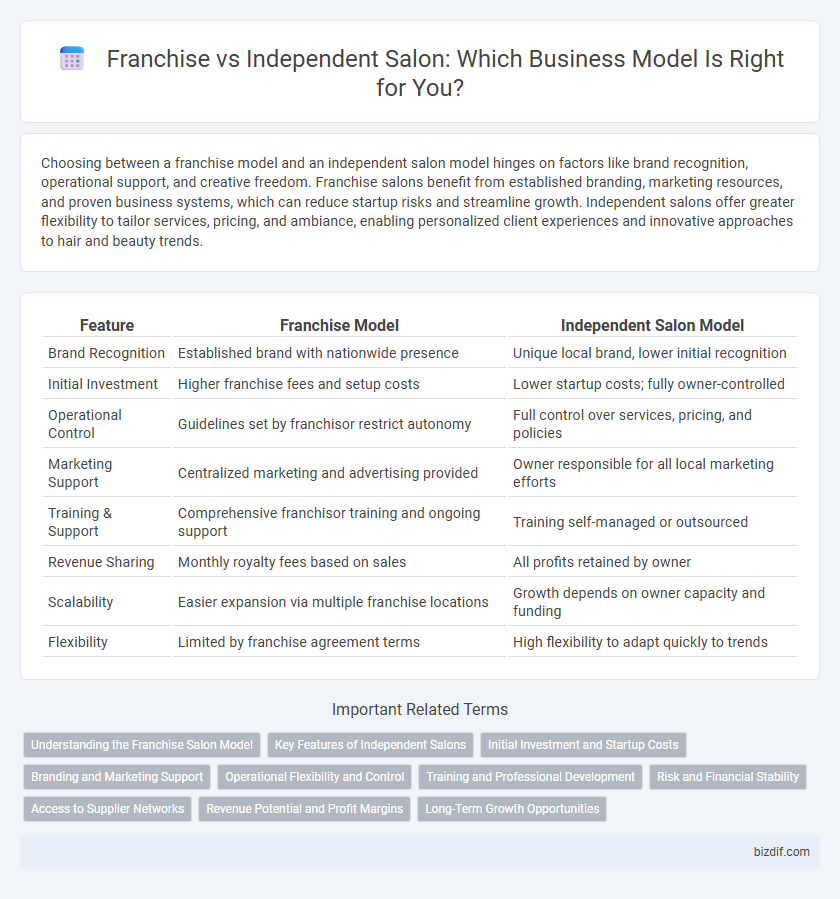Choosing between a franchise model and an independent salon model hinges on factors like brand recognition, operational support, and creative freedom. Franchise salons benefit from established branding, marketing resources, and proven business systems, which can reduce startup risks and streamline growth. Independent salons offer greater flexibility to tailor services, pricing, and ambiance, enabling personalized client experiences and innovative approaches to hair and beauty trends.
Table of Comparison
| Feature | Franchise Model | Independent Salon Model |
|---|---|---|
| Brand Recognition | Established brand with nationwide presence | Unique local brand, lower initial recognition |
| Initial Investment | Higher franchise fees and setup costs | Lower startup costs; fully owner-controlled |
| Operational Control | Guidelines set by franchisor restrict autonomy | Full control over services, pricing, and policies |
| Marketing Support | Centralized marketing and advertising provided | Owner responsible for all local marketing efforts |
| Training & Support | Comprehensive franchisor training and ongoing support | Training self-managed or outsourced |
| Revenue Sharing | Monthly royalty fees based on sales | All profits retained by owner |
| Scalability | Easier expansion via multiple franchise locations | Growth depends on owner capacity and funding |
| Flexibility | Limited by franchise agreement terms | High flexibility to adapt quickly to trends |
Understanding the Franchise Salon Model
The franchise salon model provides entrepreneurs with a proven business framework, established branding, and extensive marketing support, which helps reduce startup risks compared to independent salons. Franchisees benefit from standardized training programs, bulk purchasing power, and ongoing operational guidance that streamlines salon management and enhances customer experience. This model often requires initial franchise fees and royalties, but the structured system and recognized brand reputation can accelerate growth and profitability.
Key Features of Independent Salons
Independent salons emphasize personalized customer experiences, flexible service menus, and creative freedom for stylists. They often support local branding, foster close-knit client relationships, and adapt quickly to market trends without corporate restrictions. This model enables salon owners to tailor pricing, ambiance, and marketing strategies uniquely to their target audience.
Initial Investment and Startup Costs
Franchise salons typically require a higher initial investment, often ranging from $150,000 to $500,000, due to franchise fees, marketing contributions, and standardized equipment requirements. Independent salons generally have lower startup costs, which can vary widely from $50,000 to $200,000 depending on location, size, and customization of the space. Understanding these financial commitments is crucial for entrepreneurs when choosing between a franchise model with brand support and proven systems or an independent salon offering greater operational freedom.
Branding and Marketing Support
Franchise salons benefit from established branding and comprehensive marketing support, leveraging national campaigns and proven strategies to attract clientele. Independent salons often face challenges in brand recognition but gain flexibility to tailor local marketing efforts and build a unique, personal brand identity. Strong franchise systems provide consistent promotional materials and digital marketing tools, enhancing visibility and customer trust compared to standalone salons.
Operational Flexibility and Control
The franchise model offers standardized operational procedures and marketing support, reducing decision-making flexibility but ensuring brand consistency across locations. Independent salons maintain full control over daily operations, allowing for tailored client experiences and personalized service offerings that adapt quickly to market trends. Operational flexibility in independent salons often leads to innovative service customization, while franchise salons benefit from streamlined processes and centralized management systems.
Training and Professional Development
Franchise salons provide structured training programs and ongoing professional development supported by a standardized curriculum, ensuring consistent skill advancement across all locations. Independent salons often offer more customized and flexible training tailored to individual stylistic approaches but may lack the comprehensive resources and formalized progression found in franchise models. Investing in professional development through franchises can lead to accelerated career growth, whereas independent salons foster unique creativity and personalized mentorship.
Risk and Financial Stability
The franchise salon model offers reduced financial risk through established brand recognition, standardized operations, and corporate support, often ensuring more predictable revenue streams and easier access to funding. Independent salons face higher financial volatility due to market dependence on local reputation, self-managed marketing, and operational costs but maintain greater autonomy and profit control. Evaluating risk tolerance and capital availability is critical when choosing between the structured stability of franchises and the entrepreneurial flexibility of independent salons.
Access to Supplier Networks
Franchise salons benefit from established supplier networks that offer bulk purchasing discounts, exclusive product lines, and streamlined inventory management, enhancing cost efficiency and product availability. Independent salons often face challenges negotiating competitive terms with suppliers due to smaller order volumes but can select specialized or local products tailored to their clientele. Access to robust supplier networks in franchises provides a strategic advantage, while independents emphasize flexibility and unique product curation.
Revenue Potential and Profit Margins
Franchise salon models typically offer higher revenue potential due to established brand recognition and centralized marketing, attracting a steady client base. Independent salons often achieve better profit margins by maintaining full control over pricing, supplier selection, and operational costs, avoiding franchise fees and royalties. While franchises benefit from economies of scale, independent salons have greater flexibility in creating unique customer experiences that can drive local loyalty and profitability.
Long-Term Growth Opportunities
Franchise salons offer structured growth opportunities with established brand recognition, marketing support, and a proven business model, which can accelerate market penetration and profitability. Independent salons allow greater creative control and flexibility in service offerings, fostering personalized client relationships that contribute to sustainable local growth. Long-term success in both models depends on adapting to industry trends, maintaining high-quality customer experiences, and strategic reinvestment in business development.
Franchise Model vs Independent Salon Model Infographic

 bizdif.com
bizdif.com